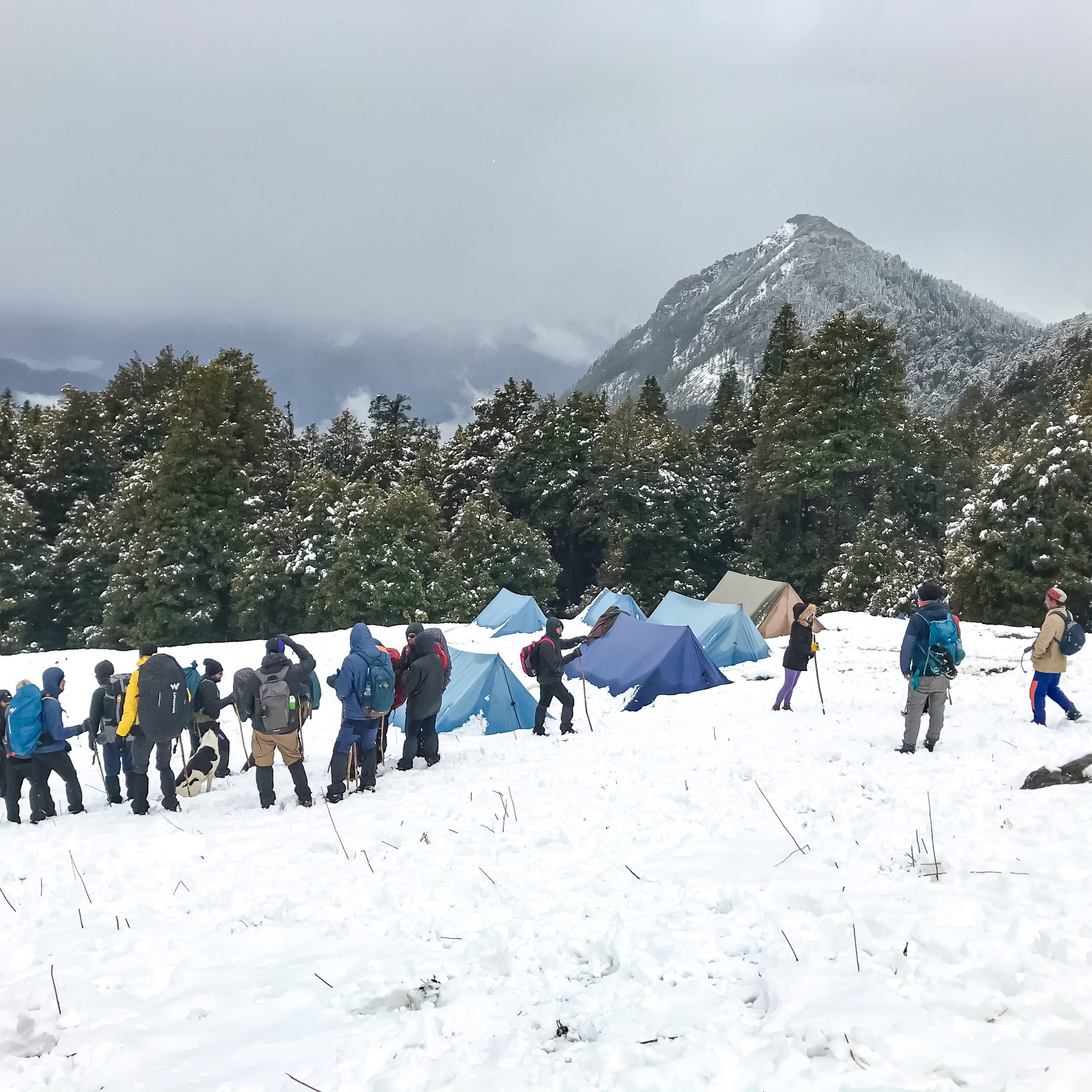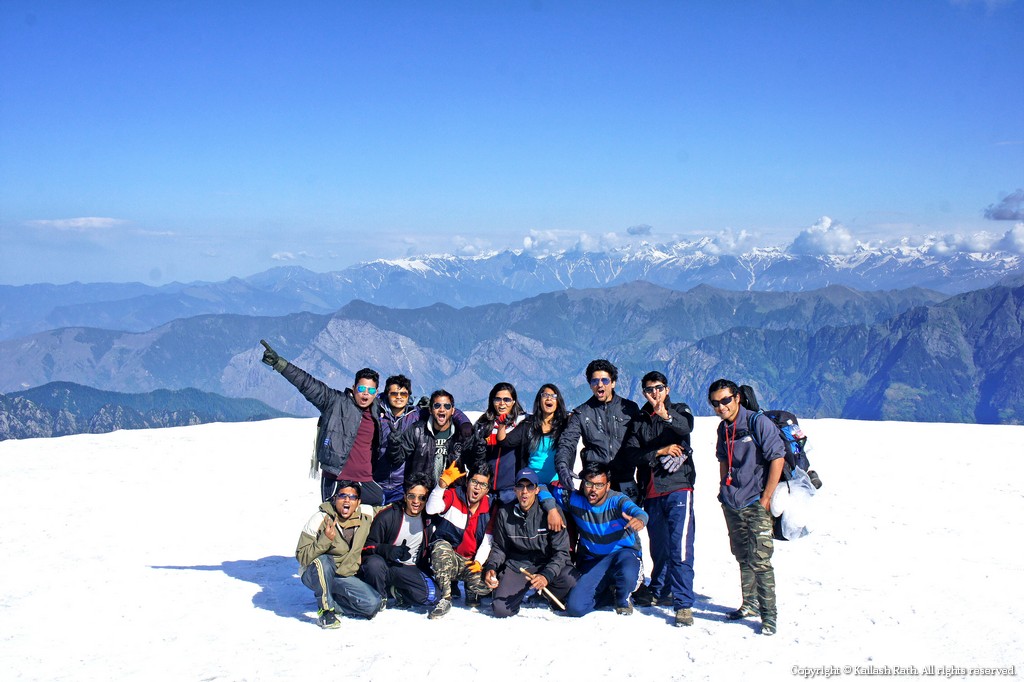from 0 review
7 Days/6 Nights
Specific Tour
30 people
English, Hindi
The Nature Study program is meant for introducing school children to nature through a week-long adventure and trekking based program. Students get to spend time outside outside experiencing nature and walking the trails, while learning how to identify the common Himalayan flora and fauna. Students are encouraged to ask questions and make observations about the relationship between different elements of ecosystem. The program also incorporates team building activities and games to foster a good relationship among kids of different ethnic, religious & national groups.
✔️Trekking shoes : Carry water proof trekking shoes with good grip and ankle support. Do not carry sports shoes.
✔️Three layers of warm clothes : Carry two or three-layer jackets, fleece jackets and a padded jacket.
✔️Two/Three trek pants : Carry light cotton trek pants. Denim/jeans and shorts are not suitable for trekking.
✔️Three t-shirts (collared/dri-fit) : Full sleeved t-shirts that prevent sun burns on the neck and arms. Carry one or two dri-fit t-shirts.
✔️Thermals : Carry thermals (top and bottom).
✔️Sunglasses : Sunglasses are mandatory. There will be lot of snow on the trek and can cause snow blindness.
✔️Cap : At high altitude, the sun is extra harsh so carry a cap to protect yourself.
✔️Water proof hand gloves : Carry water proof gloves and avoid woollen gloves as they will get wet if you touch snow.
✔️Socks (3-4 pairs) and a pair of woollen socks : Apart from two sports socks, you can take a pair of woollen socks for the night.
✔️Headlamp/LED torch : Mandatory
✔️Raincoat/Ponchos : At high altitudes, snowfall and rain are quite common and it’s mandatory to carry a poncho so that you don’t get wet. The trek will continue as planned even during rainfall.
✔️Lunch box and water bottle : Every participant should have their personal lunch box and a water bottle [insulated type].
✅ Accommodation
✅ Meals (Breakfast, lunch, snacks, dinner)
✅ Camping charges (forest and camping permissions)
✅ Trekking equipment (High quality tent, sleeping bag etc)
✅ Gaiters (to protect your shoes from snow)
✅ Safety equipment (advance first-aid kit)
✅ Expert Leaders (certified trek and camp leaders)
✅ Expert Support Team (cook, helpers etc)
✅ GST 5%
✅ Personal Insurance (via ASC 360)
❎ Transportation and food to and from the base camp
❎ Backpack offloading charges
❎ Any Personal Expenses
❎ Cost of Emergency
✔️Original and photocopy of government photo identity card- (Aadhar card)
✔️Medical Certificate (signed by a registered MBBS doctor)
✔️NOC form (signed by the participant)
click here to download medical certificate and NOC
![Day 1 : Arrival in Rumsu [Manali] Basecamp, Reporting.](http://kailashrath.com/wp-content/uploads/2022/03/IMG_6772-scaled.jpg)
Our Eco Trekkers will be woken to the sight of green, towering Sierras of the Kullu District. We will arrive at our destination in the early hours of the day. They will detrain the Bus at the Patlikuhal Junction and will head upward the range toward the Rumsu [Manali] Basecamp at 6510 Ft above sea level. Today will be a rest day. Breakfast will be served in the dining hall, followed by the registration, documentation and tent allocation. An orientation will be given to the group of Eco trekkers giving them a detailed insight on the proceedings of the next five days in the wilderness of the bountiful Himalayas. Following this orientation, we will make them put it to use on a short walk to the Pulag falls from the Rumsu [Manali] Village, where they will learn about rocks found around at a subordinate level and will return for a siesta. In the evening, a bonfire will be lit and the Eco Trekker will circle around it for an Ice Breaking session followed by dinner. They will be issued their bedding (Sleeping bags + Inners).

The Eco Trekkers wake up to a morning of playfulness have their breakfast and set out on a walk to the Chichogi Village to study about a Himalayan Village, their customs, architecture, food and way of life. Post lunch they will have their adventure activity session where they will Rock Climb and Rappel down. They will be served an early dinner and will head to bed early for a fresh start the next day.

After morning breakfast we will start with a beautiful jeep ride to Gulaba. The trek commences from Gulaba towards Rohlikohli camp site. The 5 to 6 hours ascend till Rohlikohli is moderate. There are two streams on the route towards the camp site (Chor Nallah and Kohli Nallah). Rohli Kohli is a beautiful campsite and offers amazing views of Solang Valley. Overnight camp at Rohli Kohli.

Trek commences early in the morning by 7 am after breakfast, for Bhrigu Lake. It takes around 4 hours to reach to Bhrigu Lake. Packed lunch will be done at Bhrigu Lake. Care should be taken that no littering happens over here. As per the myths, Rishi Bhrigu meditated here and used to take bath in the holy water. We will then start for the descend to Rohlikohli camp site. Overnight stay in tents at Rohlikohli campsite.

We will start with descend this morning for Gulaba. The descent is easy and takes around 3-4 hours. Ride to Rumsu base camp.

Today starts very relaxedly in comparison to the previous four days early rising, followed by breakfast, Certificate distribution and Departure from the base camp toward Kullu via Kais Monastery. The Dhakpo Shedrupling Monastery was inaugurated by His Holiness the Dalai Lama in the month of May 2005, giving one an insight of the Buddhist culture. Following the visit to the Gompa, the Eco Trekkers will continue for Rafting activity. The activity happens in Beas river and is of 9 kms. Departure from the Kullu Bus stand complex, bidding goodbye to the abode of snow, Himachal Pradesh.
Sar Pass is an ideal trek for beginners. It is appropriate for participants who wish to experience all kinds of terrain. This trek includes forests, meadows, villages and snow-covered mountains.
The Sar pass trek offers an absolute escapade and is recommended for beginners and moderate level trekkers.
-Trek through forests, meadows, villages and snow clad mountains.
-Climb to the summit of Sar Pass at 13,800 ft for stunning views of snow-capped peaks.
-The trek starts from Kasol, which is a haven for backpackers from around the globe.
Sar Pass takes min of 5 nights and 6 days to start from Kasol-Grahan-Min thach-Nagaru-Biskeri thach-kasol.
The best seasons to do the Sar Pass is between April mid - June mid to experience the good amount of snow on the trek.
It could be done between June mid to Oct as well but one will not any snow on the trail and chances of rain are also high.
Sar Pass – An extensive route in Parvati valley, stands at a majestic 13,800 ft. With the stunning views of jagged mountains and snow-capped peaks all around.
The average temperature in the daytime will be 12°C to 18°C and in night it could be 0°C to 4°C.
One must bring enough pair of clothes and best-quality trekking boots (Water proof) to cover the whole trek carefully and does not face any difficulties due to cold.
Preparing yourself well before coming for and Himalayan trek is really important. Sar pass is easy-moderate trek and requires basic level of fitness.
Basic physical fitness you can achieve by routinely doing a 20-30 min cardio exercises like running, skipping, crunches, squats. Work on your calf muscles, knees and thighs.
Apart from basic physical fitness you need to be properly acclimatized before starting the trek so keep you body well hydrated and rest enough after reaching the base camp.
The mobile connectivity is intermittent as soon as you start the the trek from Kasol. In Grahan (2nd campsite) you will get landline facility to call in emergency. Then no network in Min Thach (3rd campsite). Nagaru (4th campsite) and Biskeri Thach (4th campsite) has good network connectivity.